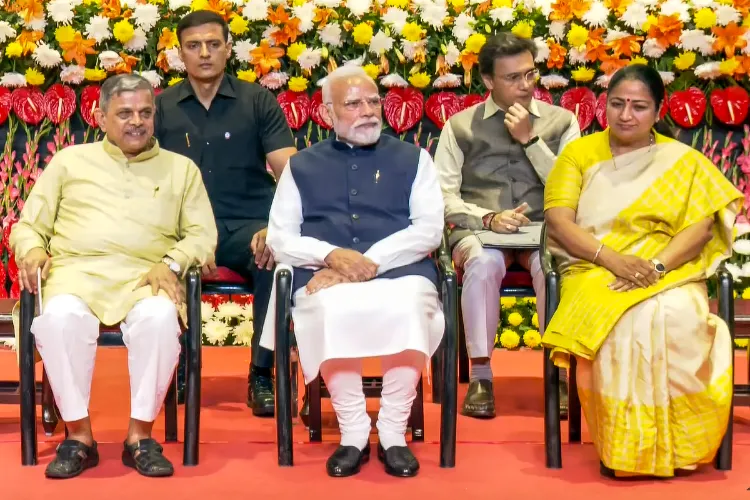
New Delhi
RSS general secretary Dattatreya Hosabale on Wednesday said the Sangh has striven for the last 100 years to become the largest voluntary organisation despite opposition because of the people's affection.
Hosabale's remarks came minutes before the release of a commemorative postage stamp and a coin to mark the centenary of the Rashtriya Swayamsevak Sangh (RSS) by Prime Minister Narendra Modi. The event was organised by the Union Culture Ministry.
The RSS office-bearer expressed his gratitude to the government for the gesture, which he said was a recognition of the Sangh's "selfless" work.
Hosabale said Sangh and its swayamsevaks have been working without self-interest on its mission of nation-building through character development of individuals since its foundation by Dr Keshav Baliram Hedgewar on the occasion of Vijayadashmi in 1925.
"It's a matter of joy for the Sangh's swayamsevaks and patriots that the government of India, under the leadership of Prime Minister Narendra Modi, decided to release a postage stamp and coin on this special occasion," the RSS second-in-command said.
"On behalf of all the swayamsevaks, including those spread across the world, I want to express my gratitude for this," he said.
Hosabale said recognising individuals and organisations for their contributions to the nation has been a longstanding tradition in India.
"The government of India has continued this tradition. I believe that in this way, a recognition and honour have been given to the Sangh's work on behalf of the people of Bharat on the occasion of the Sangh's centenary," he added.
Hosabale termed the RSS' 100 years an "interesting" journey and said the Sangh has been able to come this far due to the support and acceptance of its idea by the people of the country. "The Sangh had to face all kinds of indifference, opposition, struggle, but since the day (of RSS foundation), Sangh workers experienced people's intimacy, affection, support and cooperation," he said.
The Sangh general secretary said the "RSS' thought is the thought of Bharat" embedded in its roots, its culture and its civilisation.
For thousands of years, people of Bharat practised and lived this thought, and carried it forward with a resolve to build a superior society, he said. "We are the identity of that thought, that philosophy of life, that culture," he said.
Hosabale said Sangh's thought has rekindled joy among people and re-instilled confidence in them that they are capable of rising as "the best society" in the world.
"The Sangh is seen by the country today as a dominant and a successful symbol of patriotism, discipline and selfless service," he said.
The RSS is making efforts to organise the society to awaken its "purusharth" (objective, goal) so that it becomes capable of surmounting all the challenges coming in its way, he said.
Hosabale said that attempts in bad faith were made over the past few decades to present a "distorted" image of India before the world.
"In the last few years, the picture of the country changed, and the governments too, with the success of our work," he said.
"... A new path has emerged. We have to strengthen Bharat's vimarsh (narrative) within the country and across the global stage as well. Across the world, Bharat's narrative about Bharat must be positive, based on truth. This is the Sangh's idea on this occasion of its centenary," he added.
As part of the RSS' agenda to bring a five-fold transformation of society, Hosabale called upon people to promote and adopt 'swadeshi' products and make India self-reliant.
With its 'Panch Parivartan' agenda, the RSS seeks to inculcate among the people of the country a sense of 'swa' (selfhood) with 'Bharatiya' values, right family values, strike social harmony, adopt an environment-friendly lifestyle, and perform their civic duties.
Revisiting the RSS' journey since its inception, Hosabale said in a statement that in the early years, the young karyakartas set forth across the country like dedicated warriors, driven entirely by their love for the nation.
"A family man like Appaji Joshi or full-time pracharaks such as Dadarav Parmarth, Balasaheb and Bhaurao Deoras brothers, Yadavrao Joshi, Eknath Ranade, all of them, under the guidance of Dr Hedgewar, took Sangh work as a "sacred vow of lifelong service to the nation," he said.
"Inspired figures like Dattopant Thengadi, Yashwantrao Kelkar, Balasaheb Deshpande, Eknath Ranade, Deendayal Upadhyaya and Dadasaheb Apte drew strength from the Sangh and went on to build several organisations in different walks of social life," the RSS general secretary said.
These organisations, "with immense growth", have brought about "constructive changes" across many fields, he added in the statement posted on the RSS' website.
Hosabale said the Sangh has raised several issues of national importance, "always with society standing in support", and consistently sought consensus and cooperation on matters of Hindu unity, national security, social harmony, democracy and preservation of culture.
"Thousands of swayamsevaks endured unimaginable hardships and many laid down their lives. Through all this, society's hand of support was always there," he said.
Hosabale said after Independence, when "political reasons" led to a ban on the Sangh's activities, it was not only ordinary people but also "highly respected figures" who openly stood by it, giving courage in those difficult times.
"The same was experienced during the Emergency. That is why, despite so many obstacles, Sangh work has continued seamlessly and steadily," he added.
Hosabale said the Sangh swayamsevaks will make a "special effort" in this centenary year to reach every household -- across big cities, remote villages and among all sections of society -- to invite "wider cooperation and participation" in the mission of national service.
ALSO READ: Tilak spoke with coach Salam Bayash from Dubai at crucial moment
"With the coordinated effort of all well-meaning forces of society, the next stage of our nation's journey -- towards holistic development -- will certainly be smoother and more successful," he added.
